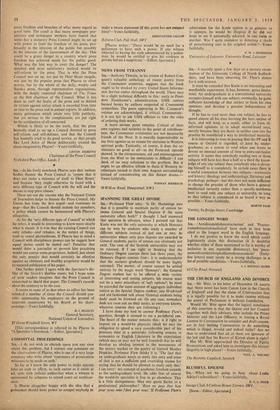SPANNING THE GREAT DIVIDE
S1R,—Professor Flew asks : 'Is Dr. Hethmings sure that it is possible to maintain parity of esteem be- tween General and Special Degrees if the same university offers both?' I thought I had answered that question in advance, when I pointed out that Keele was not the only university at which Honours can be won by students who study a number of different subjects instead of just one or two. At universities where only pass degrees are awarded to General students, parity of esteem can obviously not exist. The case of the Scottish universities may not be relevant, if I am right in thinking that the Ordinary Degree courses there last three years, the Honours Degree courses four : it is understandable that the maturer graduate should be more highly esteemed. The matter, of course cannot be settled entirely by the magic word 'Honours': the General Degree student has to be offered a wide variety of interesting and testing subjects, his course must not be a mere miscellany of 'soft options% he must be accorded the same amount of aggregate individual tuition as the Special Degree student; any ill-advised and old-fashioned talk about 'General students being duds' must be frowned on. (In any case, nowadays duds are soon out on their necks, as everyone knows, whatever courses they are following.)
I have done my best to answer Professor Flew's question, though it seemed to me a peripheral one. The heart of the matter remains this : is it right to impose on a would-be physicist (shall we say) the obligation to spend a very considerable part of his precious time at a university following courses in economics or English Literature in the expectation (which may or may not be well founded) that he will develop an abiding interest in ,the movements of the money market or the poetry of Gerard Manley Hopkins. Professor Flew thinks it is. 'The fact that an undergraduate wants to study this only and none of that is not a sufficient and overriding reason for saying that he should be allowed to study only this' I am sorry : my concept of academic freedom extends to the undergraduate level. He adds that of course the would-be specialist is free to go elsewhere. This is a little disingenuous. May one quote Sartre to a
professional philosopher? 'Rim ne pent etre bon pour nous sans retre pour sous.' If Professor Flew's
admiration for the Keele system is as genuine as it appears, he would be illogical if he did not hope to see it universally adopted, in one form or another. Was I quite mistaken in detecting a shade of proselytising zeal in his original article?—Yours faithfully,
F. W. J. HEMMINGS
University of Leicester, University Road, Leicester










































 Previous page
Previous page